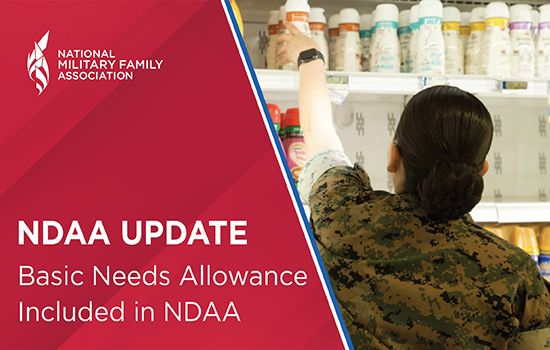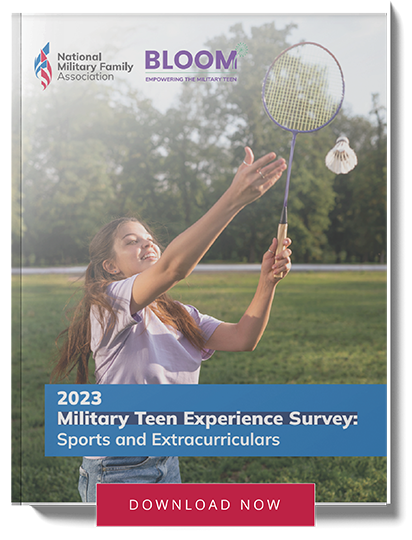Help is on the Way: Congress Passes the Basic Needs Allowance

Too many military families struggle to put food on the table. At NMFA, we’ve heard from families for years and have long advocated for policy solutions that could help, but the pandemic effectively turned an ongoing food insecurity problem into a food insecurity crisis.
“This year has been the hardest for us,” one military spouse told us this November. “It’s always a struggle to put consistent food on the table for me and my kids.” Our own research affirms that experience, with 14 percent of families in ranks E1-E6 telling us they’ve visited a food bank in the last 12 months. In our inaugural Military Teen Experience survey, a third of surveyed teens told us they were worried about their families having enough food to put on the table.
Finally, leaders in Congress are starting to pay attention.
The FY 2022 National Defense Authorization Act (NDAA) includes a Basic Needs Allowance (BNA) to help the most vulnerable military families. Under this new program, the Services will identify families whose income and household size puts them below 130 percent of federal poverty guidelines. Those families will be notified that they could be eligible for the BNA and given the opportunity to apply. We still aren’t sure what this process will look like – or how long it will take for a family who has applied to get their decision. But service members who qualify and are approved will receive a small pay boost – enough to make a big difference for a family struggling to cover all their bills and still feed their kids.
But the news isn’t all good.
Congress chose to include BAH in determining eligibility for BNA, which will put this new allowance out of reach for many families who are most in need of help. Especially as housing prices continue to go up in many areas, families need every penny of their BAH – and then some – to cover housing costs. It shouldn’t count against them when it comes to getting much needed help to pay for food.
Congress did include a compromise in the bill. The Secretary of Defense will be able to exclude a portion of BAH in determining eligibility for the BNA for families living in high cost areas. The language provides wiggle room for advocates like us to stand up for military families in need, but it also leaves lots of questions unanswered: What portion? And what constitutes a high-cost area?
Including the Basic Needs Allowance in the NDAA is an important first step – but it’s just a first step. For families in need, our work continues, and we won’t stop fighting until every military family has the resources they need to thrive.
So what’s next?
Congress directed DoD to implement the Basic Needs Allowance within one year of the enactment of the NDAA, but the process is just beginning. After Congress votes on the bill and the President signs it into law, DoD will begin working on crafting the policy that will become the Basic Needs Allowance program. All those questions we have unanswered – How much BAH? What areas will count as high-cost? How long will it take from application to decision? – will be answered as the policy is written. It’s during this process that we continue our advocacy on your behalf. No military family should go hungry – and we will keep working until none do.




